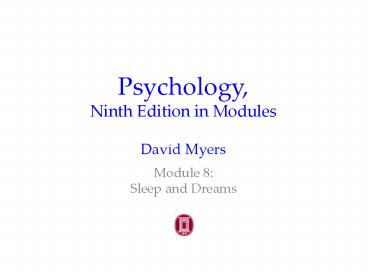Psychology, Ninth Edition in Modules David Myers - PowerPoint PPT Presentation
1 / 22
Title:
Psychology, Ninth Edition in Modules David Myers
Description:
Carrie s EEG shows sleep spindles. Which stage of sleep is she in? A. stage 1 B. stage 2 C. stage 3 D. REM REM Sleep Brain activity: fast, active ... – PowerPoint PPT presentation
Number of Views:238
Avg rating:3.0/5.0
Title: Psychology, Ninth Edition in Modules David Myers
1
Psychology, Ninth Edition in ModulesDavid Myers
- Module 8
- Sleep and Dreams
2
Biological Rhythms and Sleep
- Circadian Rhythms occur on a 24-hour cycle and
include sleep and wakefulness. Termed our
biological clock, it can be altered by
artificial light.
Light triggers the suprachiasmatic nucleus to
decrease (morning) melatonin from the pineal
gland and increase (evening) it at nightfall.
3
Sleep Stages
- Measuring sleep About every 90 minutes, we pass
through a cycle of five distinct sleep stages.
Hank Morgan/ Rainbow
4
Brain Waves and Sleep Stages
- Alpha Waves
- slow waves of a relaxed, awake brain
- Delta Waves
- large, slow waves of deep sleep
- Hallucinations
- false sensory experiences
5
Awake but Relaxed
When an individual closes his eyes but remains
awake, his brain activity slows down to a large
amplitude and slow, regular alpha waves (9-14
cps). A meditating person exhibits an alpha brain
activity.
6
Sleep Stages 1-2
During early, light sleep (stages 1-2) the brain
enters a high-amplitude, slow, regular wave form
called theta waves (5-8 cps). A person who is
daydreaming shows theta activity.
Theta Waves
7
Sleep Stages 3-4
During deepest sleep (stages 3-4), brain activity
slows down. There are large-amplitude, slow delta
waves (1.5-4 cps).
8
Stage 5 REM Sleep
After reaching the deepest sleep stage (4), the
sleep cycle starts moving backward towards stage
1. Although still asleep, the brain engages in
low- amplitude, fast and regular beta waves
(15-40 cps) much like awake-aroused state.
A person during this sleep exhibits Rapid Eye
Movements (REM) and reports vivid dreams.
9
Carries EEG shows sleep spindles. Which stage
of sleep is she in?
- A. stage 1
- B. stage 2
- C. stage 3
- D. REM
10
REM Sleep
- Brain activity fast, active brain waves
accompanied by rapid eye movements visual and
motor neurons in the brain fire repeatedly, just
as they do during wakefulness - Duration five or more minutes
- Consciousness dreams occur
- Voluntary muscle movement suppressed though
muscle twitches may occur heart rate, blood
pressure, and breathing fluctuate considerably - Called paradoxical sleep, because although the
brain waves look like stage 1 sleep, the body is
more aroused during REM sleep than during stage 1
sleep.
11
Patterns of Sleep
- Throughout the night, the sleeper cycles between
regular and REM sleep, in 70-120 minute cycles. - Stage 2 and REM periods increase in duration
throughout the night, while stage 3 and 4
shorten. - Over the course of the life span, individuals
sleep less. - Infants sleep about 16 hours a day the average
72 yr old sleeps about 6 hours. - Infants spend half their sleep time in REM
adults spend less than 25.
12
90-Minute Cycles During Sleep
With each 90-minute cycle, stage 4 sleep
decreases and the duration of REM sleep increases.
13
Sleep Across the Lifespan
14
Sleep Disorders
- Insomnia Trouble falling asleep or staying
asleep - Narcolepsy Falling asleep in the midst of
waking activities. - Sleep Apnea Stop breathing briefly but
repeatedly during the night. - Sudden Infant Death Syndrome When a baby stops
breathing and dies during sleep. - Nightmares
- Night Terrors Horrific dream images occurring
during state IV sleep followed by a rapid
awakening and an intense feeling of fear. occur
within 2 or 3 hours of falling asleep, usually
during Stage 4 - high arousal-- appearance of being terrified
- seldom remembered
15
Those who complain of insomnia typically _______
how long it actually takes them to fall asleep
and ________ how long they actually slept.
- A. underestimate overestimate
- B. overestimate underestimate
- C. underestimate underestimate
- D. overestimate overestimate
16
Preventing SIDS
- Put baby to sleep on his/her back
- Do not allow anyone to smoke around your baby or
in your babys home/surroundings. - Do not place ANY blankets, toys or pillows in
babys crib/cradle until he/she is at least one
year old. - Keep the temperature between 63 and 68 degrees.
Make every effort to keep baby free from
infection and treat illness immediately - Use a firm mattress. Do not use a hand-me-down
mattress. - Get proper prenatal care and nutrition
17
Sleep Deprivation
- Effects of Sleep Loss
- fatigue
- impaired concentration
- depressed immune system
- greater vulnerability to accidents
18
Sleep Deprivation
19
Dreams Freud
- Dreams
- sequence of images, emotions, and thoughts
passing through a sleeping persons mind - hallucinatory imagery
- discontinuities
- incongruities
- delusional acceptance of the content
- difficulties remembering
20
Your friend insists that she rarely has dreams.
What is the most likely explanation for this
situation?
- A. She probably has dreams every night, but
only rarely remembers her dreams. - B. She probably uses barbiturates to help her
sleep every night. - C. This is normal most people never dream.
- D. She stays up too late at night and gets up
too early in the morning.
21
Dreams Freud
- Sigmund Freud--The Interpretation of Dreams
(1900) - wish fulfillment
- discharge otherwise unacceptable feelings
- Manifest Content
- remembered story line
- Latent Content
- underlying meaning
22
Dreams
- As Information Processing
- helps facilitate memories
- As a Physiological Function
- periodic brain stimulation
- REM Rebound
- REM sleep increases following REM sleep
deprivation































